- Home
- Lise McClendon
Blackbird Fly Page 13
Blackbird Fly Read online
Page 13
Was that — yes, it must be. Sister Evangeline. Who had the key to the gate. The knit cap and brown hair were a disguise — or a new disguise. The baggy pants, the small nose: it had to be her. Merle slipped on the mossy stones, ran in the direction she’d gone but the street was empty.
Tristan leaned the extension ladder against the house, estimated the distance to the roof and raised the top section. He climbed slowly up to the edge of the sloped tile roof slick with moss. His mother was tearing around the village, mad to get the utilities hooked up and handymen hired. He might fix the roof. Or just take a look.
He squinted into the sun, getting a long view of the vineyards that wrapped and twisted around the hills that surrounded the village. Tall trees swayed in the wind on top of a hill next to a large house which he guessed qualified as a chateau. A creek ran down the opposite hill, bisecting the vineyards laid out in careful rows that matched the topography like a tight glove. The hole in the roof was almost two feet across. Major. He climbed back down and went to check on the plumber.
Fernand stood scratching his head in the back room of the first floor where his mother wanted both a bathroom and a kitchen, even though it wasn’t even half the size of their kitchen at home. She also wanted to make the stone outhouse into a real laundry room. But first Fernand needed to get water into the house. He shook head sadly at Tristan.
“No water? ”
“Non, rien.”
Fernand went on in French but Tristan couldn’t follow it. He pointed down the drain in the floor. “Where does this go? To the sewer line?”
Fernand held up a finger. “Ah! Oui!” He motioned Tristan to follow him into the living room where the big cupboard had been pulled back from the wall. He leaned down, stuck two fingers in knots and pulled up the floorboards.
“A trap door! Cool.”
Fernand jabbered away then began to close the door again when Tristan held his arm. Grabbing a flashlight out of the tool pile Tristan shone it down the opening. He made walking motions with his fingers. Fernand looked alarmed. “Wait here. Attendez-moi ici.”
Tristan stepped onto the wooden stairs, tapping each one with his toe for rotten planks before shifting his weight onto it. Lower and lower he went, until only his head was above the floor. He waved at Fernand and disappeared.
Merle pushed through the front door of the house, noting again the weak hinges and need for grease. Tomorrow she would paint it. Yesterday she’d scraped and sanded the door and found the wood in decent shape, its curved top too pretty to replace.
“Mom!”
Tristan and Fernand turned toward her. Her son was covered with dirt, cobwebs on his eyebrows. “There’s a cellar. It’s full of old junk.” Tristan shone his flashlight down the hole in the floor. “Fernand says that hole in the back room hooks up with the sewer.”
Merle looked at the plumber. He shook his head. “Pas d’eau. No water. Mais — How you say, sewage? I put zee water down the hole and voila! It disappear!”
“But you have to dig?”
“Ah, oui, madame.” He said the water line connected from the alley. “Tomorrow, we dig.”
“And today,” Merle said, marching outside, skirting the debris, “we open the gate.” With a sort of magic, the key slipped into the lock. She wiggled it and pushed down the handle. It swung open.
She held the key tightly against her chest. The encounter with Sister Evangeline, if that’s who she was, seemed like a dream. Why had she given Merle the key? Did she kill Justine LaBelle? It didn’t sound like it but who knew. She would have a chat with the inspector.
But first, a trip to the dump. “Fernand? Do you know a man with a truck?”
The next morning digging began in earnest. Merle primed the front door as Tristan helped Fernand and Luc in the yard. The blessed event of taking all the mattresses, upholstery, preserves, and rotten trash to the dump had taken place late the previous evening. The yard looked three times bigger without it.
In late morning they took a break. Merle motioned Fernand to the outhouse while Luc and Tristan draped themselves over chairs, exhausted. The plumber called the small building ‘le pissoir’ with a sneer. He measured it and discussed — mostly with himself — the legal, physical, and environmental problems of closing up a centuries-old crapper.
Merle put her hands on her hips. You had to take a firm line with workmen, she knew that from previous renovations. “I want a laundry room. This is perfect.”
He took off his little hat and rubbed his nearly-bald head. “We have no water.”
“Keep digging and we will. We must, Fernand.” She stuck her head through the outhouse door, a true act of courage. “Is this wide enough for a washer and dryer?” She stepped inside, stretched her arms and could touch both walls. Clothes dryers were not common in rural France with all its sunshine. Especially in medieval latrines.
Fernand got out his tape measure again and measured the inside dimensions. He wrote in a little notebook, tapping the pencil lead to his tongue like a character from a ‘40s movie. Frowning, he measured again.“Bizarre. Forty-seven centimeters wider on the outside.” He held his hands eighteen inches apart.
“Maybe it’s the thickness of the walls.”
They were only four inches thick. The latrine appeared to match the stone on the back of the house, a more recent addition, down to the stone sills on the windows.
Fernand walked around the latrine, tapping the walls with his metal tape measure. “Voila!” He said one side wall, left as you entered, was thicker. There was a false wall on the inside. They could make the laundry wider by taking down the interior wall.
“Très bien,” she said. His face dropped. He didn’t do stonework, he said sadly.
Low clouds clung to the hilltops above the vineyards when the man from the water department showed up, to everyone’s surprise, with his shovel. Merle suspected the mayor’s hand in this; he wanted her finished with her house and out of town — or behind bars — as soon as possible. Was this an anti-American thing, she wondered, or did he hate all foreigners? She watched as the work began in earnest. With the plumber and his son and Tristan there were four strong backs. They took turns with shovel and pickaxe on the rocky earth and had made it through the gate and six feet into the garden when the rain began to fall. Merle moved the metal tub from the garden to the second floor to catch rain that fell through the hole, and then used it with a dose of bleach to give the armoire another scrubbing.
By mid-afternoon the rain was steady. Fernand and his crew took refuge somewhere and would probably not be back. Merle gave Tristan the sledgehammer she’d bought at the hardware store and put him to work inside the pissoir.
“Just prop the door open,” she said. “If you hit the rocks enough to loosen the mortar you can pull them out. And try not to hurt yourself.”
Tristan flexed his muscles and gave the wall a whack, dislodging dust mostly. He grimaced. “This should be fun.”
Merle watched him swat the wall again with the enthusiasm of Mighty Mouse. They had been getting along well, with minimal carping. He even seemed to enjoy the hard work. She knew the feeling. Hard work kept the mind occupied, relieved the stress of grieving. She backed away, feeling the rain run down her neck. It was welcome rain, warm and nurturing, and felt good on her face. Then she remembered the roof, frowning at the hole and the pigeon perched in it.
“Madame Bennett?” She turned to see Albert standing under an umbrella in the arch of the gate.
“Hello, Albert. Any word on that roofer?”
“I will call him again. Can you come for some tea? I have looked at those letters you gave me.”
After a check on Tristan she followed the old priest through his garden. Settled into a corner of his kitchen, she used the tea towel he offered to dry her face and hands. She’d hardly had time to say more than ‘can I use your telephone’ to Albert for the several days. “The rain is nice, isn’t it?”
He put the kettle on his stove. “Very necessar
y for the grapes. I am going out to a vineyard tomorrow, would you care to come? You get wine, very cheap.”
“I’m so busy, Albert. But thank you.” His face dropped, worry replacing his usual smile. Could he be lonely? She had seen the gendarme pass by Albert’s house, eyes dark. Maybe he had no friends here anymore. She hadn’t heard him mention any relatives. “Sure, I’d love to go.” The smile returned as he poured water into the teapot.
She dropped a lump of sugar in her tea. “I saw Sister Evangeline. I think.”
“Really? But she left town. ”
“They think she did. Do you think her gray hair was a wig? Anyway, she had brown hair and she gave me this.” Merle pulled the key to the garden gate from inside her shirt where she’d strung it on a chain. “The key to the gate. But what she said was strange. She said ‘they’ would kill for it.”
“They?”
“I assume whoever pushed Justine. But I don’t understand why would anyone kill her.”
“Do you think she slipped, or perhaps killed herself?”
“My watch was on her arm. There was a deliberate attempt to incriminate me.” Merle frowned into her tea. “Maybe that was all it was, but it seems a bit much to kill somebody just to frame me.” Albert frowned, thinking. “I don’t think Evangline was a nun.”
His kitchen had the spare feel of a monastery, cozy and dry while raindrops nattered on the windowpanes. “I had my doubts. I’ve known a good number of sisters in my lifetime. Shall I read the letters?” He pulled them from a shelf by the table, smoothing the first letter with his gnarled hand. “The writing is faint at times.”
‘Cher Marie-Emilie. It has been a long time since I have seen you but I think of you every day. Why don’t you answer my letters? Here is my address again. 743 Place de la Bastille, Segala. My situation is not good. I work for a family but they have no money. I only have the bread and a little cheese in the evening. Can you help? You said you would help but now I hear nothing. I am alone and sometimes in the night I cry. I cry for all of us.’
“There is more but I can’t read it. But it is signed, Dominique.”
Merle sat back in the chair. “I saw that. I wonder, who was she?”
“Or he. Could be a man. And this Marie-Emilie?”
“My husband’s mother. She lived in the house. Harry — my husband — was born there. But she was dead by the time these letters were sent.”
“It appears this Dominique was someone she knew. Have you looked in the old records at the parish?”
If she had time. How many days would she have here before they gave her passport back? The inspector hadn’t been by to make sure she was still in town. Even the gendarme had grown bored, making a couple cursory passes of the house each day. “Do you think she would be listed there?”
“Perhaps. If we knew her full name. Her address here is Segala. That is many kilometers away. ”
“Please, continue.”
“‘Cher Marie-Emilie. The days go by so slowly without word from you. How is the boy? I fear when you do not write. Have I offended you? The weather is fine for so close to the new year. The hired man and I will be alone when the family visits to the south. I do not like him. At night sometimes I think of Malcouziac and your kindness and I cry. I hear nothing from Malcouziac. I wonder if you do and what they say about me. I no longer care but my heart remains there and always will. Dominique.’”
“So she must be from here.”
“It appears. This is the final one. ‘Cher Marie-Emilie. I will not bother you again with my letters. The family has turned us out. There is no money, no food, no roof over our heads. A new owner has come to the mas — the farmhouse — and we are all dismissed. If you have a heart send francs to la poste in Malcouziac.’”
“A sad story.”
“These happened long ago?”
“In the early fifties. Were things bad here then?”
“The war hit this area very hard. It took much time to recover, to get the farms going, to rebuild. There were few men here to work.”
Merle finished her tea and shook her head at more. “Albert, do you think the inspector will find out who killed Justine?”
He shrugged. “He is a good man, I think. Honest.”
“But — ?”
“He does not know these people and they are not, well, open with him.”
“Do you hear any talk about the murder?”
“Very little. They say it is bad for tourist monies.”
“I bet they wish I would go home.”
Albert blinked. “Oh, no.”
“You’re too kind, Albert.” No, they wished the whole thing — crazy prostitute, greedy American, ugly murder — vanished. Then they — whoever they were — could get into the house, according to Evangeline. And do what? Steal pears from the tree? There was nothing there but dry rot and cockroaches. Even the grim, dirt-floored cellar revealed only sodden carpet, spider webs, and moldy kegs.
The telephone rang in the other room. Albert returned, smiling. “Good news. We find a roofer.”
Chapter 20
The next morning, while his mother and Albert went out to a winery, Tristan broke rocks. He stepped inside the outhouse, sweat dripping down his forehead. Luc and Fernand were attacking the ground like wild men, almost to the house with the trench. Swinging the sledgehammer would probably help build up his right arm which had been sore from fencing.
It was strange, fencing, an antique sport, useless but fun. Sometimes you felt a little gay with one hand behind your back — like any minute you’d be pulling on a codpiece and puff pants — but a few swishes of the foil made you forget about it. It was hard work. Albert had given him an old fencing foil. After this chain-gang project his mother had given him he had plans to make a cardboard opponent to hang on the back wall. He was going to call him Billy.
The wall was coming down, rock by miserable rock. A space about a foot high across the top had been liberated. He took a break to put his head under the tank. The rain from yesterday had left the yard steamy. Stripping off his t-shirt he wiped his chest and face. Across the garden the roses were pink and red, perfect buds opening toward the sun. He couldn’t remember working in the yard like this, ever. He didn’t hate it either. Which was really weird. Maybe he’d be a carpenter or a builder when he grew up. He liked working with his hands. He’d always thought he’d be like his dad, a wheeler-dealer, a Wall Street suit. But maybe not.
He was chewing on some bread when the refrigerator and the electric range arrived. The stove was basic, and the fridge was a quarter size of theirs at home. Now they could have cold drinks, at home. There was a concept. He plugged the refrigerator into the new outlet the electrician had installed and lo, and behold — zilch. No electricity. Not hooked up yet.
He was closing the door after the delivery man when he saw another man on the street, looking up at the house. He held out his hand. “Bonjour. You are the man of the house?”
“You speak English.”
“Oh, yeah.” The guy was kind of cool. He had a crooked smile and long, curly hair. He was taller than his dad, almost as tall as Tristan, but had bigger muscles under his black t-shirt. “I hitchhiked around the U.S. Six months and voila!” He snapped his fingers.
The guy was staring at the front of the house. “Are you here to do something?”
“Sorry. I am Pascal d’Onson. I heard you need a roofer.”
“Oh, yeah. We have an attic full of flying crappers.” Tristan ran through the garden to Albert’s to borrow the ladder. He watched Pascal climb up to the high roof and examine the hole. The roof was too wet so he climbed down again.
“First, the pigeons. We must send them bye-bye. Otherwise, you have a stink like no tomorrow.” Pascal said he would be back the next day with a smoke bomb. “You have a very old roof. Perhaps some water damage inside?”
They tramped upstairs, leaving their muddy shoes at the door. Pascal discussed the hole in the ceiling for a long time, staring at the bucket of
sudsy water his mother had left and the limp sheet of leaky plastic she had nailed over the hole to keep the birds out of the house. This talking was the French way. No quick decisions. Much talk must take place first, a few cigarettes, maybe a glass of wine or a coffee. Pascal jawed about joists, plaster, tiles, a possible skylight, a possible dormer window.
“A big job, will take time,” Pascal said as he left. “But we will get it licked. See you in the morning.”
In the garden the heat rose from the damp earth. The man from the water department smoked a cigarette under the acacia tree. He had decided to watch today, it seemed. The plumber and his son were throwing mud like demons. Fernand’s wife was complaining about his dirty clothes so they were determined to be done soon. Luc made a scary face describing his mother’s wrath. He was a short like his father, but young and strong, and his enthusiastic digging encouraged Tristan to keep swinging the sledgehammer.
An hour later he put down the hammer and sat on the plywood covering the pissoir’s hole. His arms burned with fatigue and his back had a cramp. He stepped carefully over the piles of mud and found the flashlight in the kitchen. He had peered over the false wall several times, once when he sent a rock flying over the top, but it was too dark and full of dust to see anything. Curiosity was a good excuse for a break.
“Terminé, Tristan?” Fernand said, his muddy hands on his hips. “You are finish?”
“Just want to see what was so secret behind the wall. Maybe a million bucks.” He twirled the big flashlight as Luc stepped out of the trench, handing his father the shovel. “Want a look?” Tristan asked.
Luc followed him inside the cramped space. Tristan mimed for him to stand on the plywood toilet top and lean over the now five foot high wall. Luc stepped up and flipped on the flashlight.
“Is it pirate booty? Gold coins?” Tristan crossed his arms and grinned. Luc stood still, pointing the light down into the dust. He stepped slowly down from the wood, solemn as he handed Tristan the flashlight. “Vous vous regardez,” he whispered.

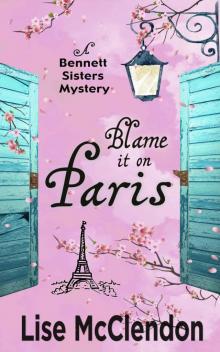 Blame it on Paris (Bennett Sisters Mysteries Book 7)
Blame it on Paris (Bennett Sisters Mysteries Book 7) Birds of a Feather: 3: Fly the Nest (Bennett Sisters Mysteries Book 16)
Birds of a Feather: 3: Fly the Nest (Bennett Sisters Mysteries Book 16)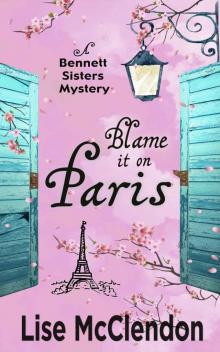 Blame it on Paris
Blame it on Paris The Things We Said Today
The Things We Said Today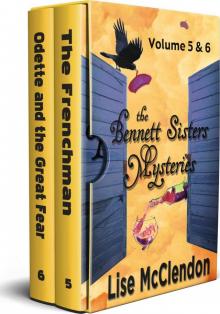 Bennett Sisters Mysteries Volume 5 & 6
Bennett Sisters Mysteries Volume 5 & 6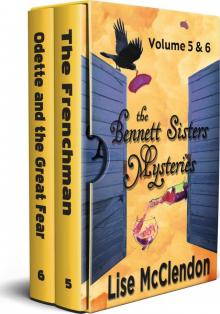 Bennett Sisters Mysteries Box Set 2
Bennett Sisters Mysteries Box Set 2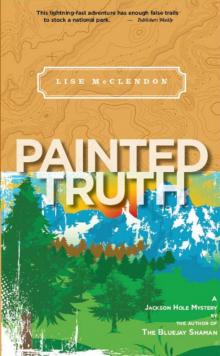 Painted Truth
Painted Truth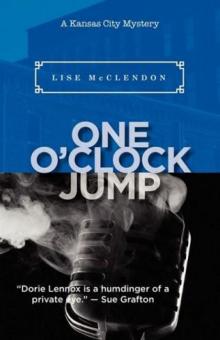 One O'Clock Jump
One O'Clock Jump The Bluejay Shaman (Alix Thorssen Mystery Series)
The Bluejay Shaman (Alix Thorssen Mystery Series) Swing Town Mysteries Dorie Lennox Box Set
Swing Town Mysteries Dorie Lennox Box Set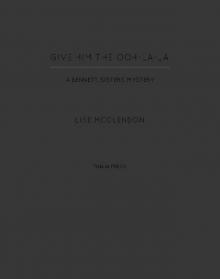 Give Him the Ooh-la-la
Give Him the Ooh-la-la Blackbird Fly
Blackbird Fly All Your Pretty Dreams
All Your Pretty Dreams Nordic Nights (The Alix Thorssen Mysteries)
Nordic Nights (The Alix Thorssen Mysteries)